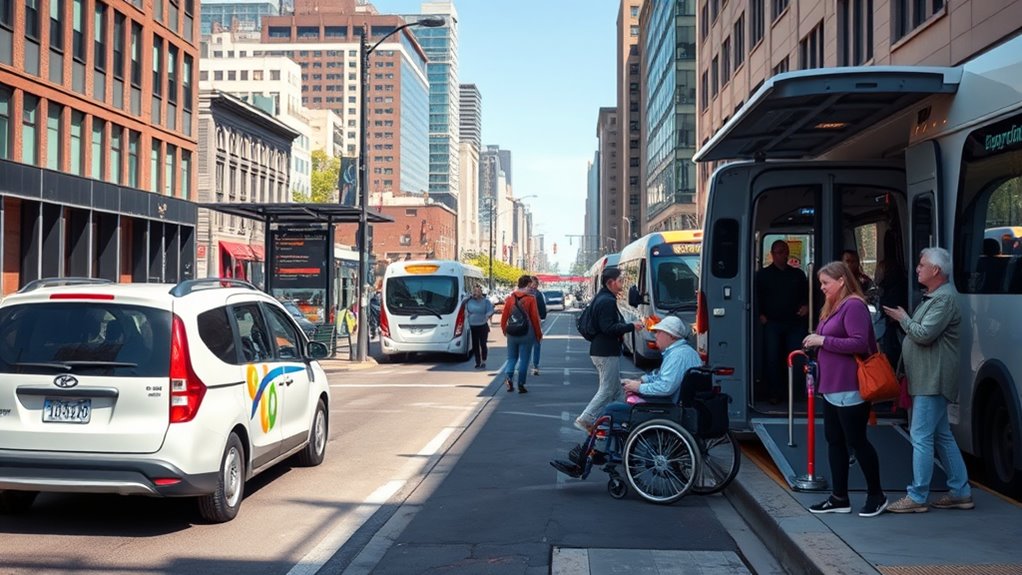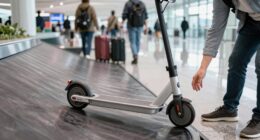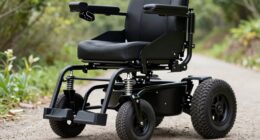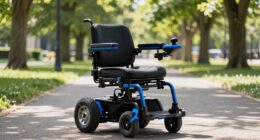If you don’t drive, you can still enjoy reliable transportation options. Public transit services like buses and community shuttles offer accessible, discounted options. Specialized rideshare services such as Uber and Lyft provide wheelchair-accessible vehicles, and programs like paratransit help with door-to-door rides. Non-emergency medical transportation and community support also make travel easier. Keep exploring to discover more ways to stay connected and independent without a vehicle.
Key Takeaways
- Public transit services, including discounted fares and accessible features, support transportation for seniors and individuals with disabilities.
- Paratransit and specialized rideshare services like Uber and Lyft offer door-to-door, wheelchair-accessible transportation options.
- Healthcare-related transportation, such as non-emergency medical transport, ensures timely access to medical appointments and hospital discharges.
- Insurance programs like Medicaid often cover non-emergency medical transportation, with additional financial support from community resources.
- Community programs, senior shuttles, volunteer drivers, and mobile apps enhance mobility and help non-drivers stay connected and independent.
Accessible Public Transit Services and Programs

Accessible public transit services are designed to make travel easier for everyone.
Many cities offer discounted or free passes for seniors and individuals with disabilities, making transportation more affordable. Transit agencies also implement features like low-floor buses, wheelchair ramps, and audio-visual announcements to assist riders with different needs. Additionally, the implementation of soulmate angel numbers can signify a readiness for emotional growth, which is essential for fostering a sense of community among riders. The increased emphasis on mental health services in public spaces also contributes to a more supportive environment for all commuters. Effective relaxation techniques can further enhance the travel experience for individuals dealing with anxiety or stress while using public transit. Moreover, understanding credit card terms can aid in managing transit-related expenses more effectively.
Many cities provide discounted passes and accessibility features like ramps and audio-visual alerts for inclusive, affordable transit.
For those unable to use standard services, paratransit programs provide door-to-door or curb-to-curb rides, ensuring mobility for all. Eligibility often requires certification under the Americans with Disabilities Act (ADA).
These accessible services promote independence, safety, and inclusion, helping you reach your destination comfortably and confidently, no matter your mobility level. Additionally, many transit agencies collaborate with home security systems to ensure that public transit areas are safe and secure for all riders.
Specialized Rideshare and Paratransit Options

For individuals with mobility limitations, specialized rideshare and paratransit options offer essential transportation solutions that enhance independence and access. These services not only provide crucial transportation but also promote a better senior living experience, allowing seniors to remain active and engaged in their communities. Many of these services also include low light office plants to create a calming atmosphere during rides. It is important to understand that open communication about feelings can significantly help individuals adjust to new transportation options. Additionally, utilizing mind-body connection practices can support emotional well-being during transitions.
Paratransit services provide door-to-door or curb-to-curb rides, designed specifically for those using wheelchairs or other assistive devices. To qualify, you’ll need to apply through your local transit agency, following eligibility guidelines under the Americans with Disabilities Act.
Rideshare services like Lyft and Uber now include accessible vehicles and in-app features for riders with disabilities. Additionally, services like GoGoGrandparent allow you to call rides by phone if smartphone apps aren’t an option.
Many public transit systems also offer senior and disability discounts, making travel more affordable. These specialized options guarantee you can travel safely and comfortably, regardless of mobility challenges. Understanding the importance of efficiency in transportation options can further enhance your travel experience.
Community and Residential Transportation Support

Community and residential transportation services play an essential role in helping non-drivers stay connected and independent. Wherever you need, make certain you have reliable transportation options for appointments, errands, or social activities.
Many senior centers and adult family homes provide their own transportation, making non-emergency medical transportation easy and accessible. These services ensure smooth entering and exiting vehicles, so you don’t have to worry about mobility challenges. Additionally, these services can support overall skin health by encouraging regular visits to healthcare providers. Nike Tech innovations in comfort and style are also influencing how transportation services are designed to cater to non-drivers. The integration of AI technology into these services is anticipated to further enhance user experiences and operational efficiency. Understanding the legal process of divorce can also be crucial for those navigating transportation needs post-separation.
Senior centers and adult family homes offer transportation that makes medical visits accessible and stress-free.
If you need to go to a healthcare facility, paratransit options offer door-to-door rides that accommodate wheelchairs and mobility aids.
Public transit systems often provide discounted fares for seniors and individuals with disabilities, further enhancing access. Additionally, with the rising trend of sustainable fashion, transportation options are increasingly considering eco-friendly practices to reduce carbon footprints.
With these transportation services, you can maintain your independence and stay engaged in your community without the need to drive.
Insurance Coverage and Financial Assistance for Travel

Did you know that insurance coverage can help reduce the costs of travel to medical appointments? Medicaid generally covers non-emergency medical transportation if you’re eligible, making it easier to attend healthcare visits. Automation in business operations can also streamline the process of managing transportation logistics for medical appointments. It’s important to note that credit card debt can impact your overall financial health, influencing your ability to afford necessary travel expenses. Additionally, using best laundry detergents can help save money on household items, allowing for more budget allocation towards travel expenses.
Medicare Part B may cover ambulance services in emergencies but usually doesn’t include non-emergency transportation unless through approved programs. Some insurance plans may also provide coverage for vehicle maintenance to ensure reliable transportation for medical visits.
Many private insurance plans offer limited coverage or reimbursements for transportation related to medical care, depending on your policy.
For those with low income or special needs, community programs and grants can provide additional financial assistance.
Certain Medicaid waivers and state-funded programs also support transportation for individuals with qualifying medical or mobility needs. Additionally, exploring wellness tracking options can assist in managing healthcare appointments effectively.
Non-Emergency Medical Transportation Solutions in Houston

Non-emergency medical transportation (NEMT) in Houston offers reliable and accessible rides for individuals with mobility challenges, including wheelchair users and seniors, ensuring they can attend medical appointments and hospital discharges without stress. Airless paint sprayers are increasingly utilized in various industries, showcasing the versatility of specialized transportation for unique needs. Trusted providers like Uber Health and local agencies deliver safe, dependable services available 24/7, often with advance scheduling. Understanding store hours can be beneficial for coordinating transportation around important appointments. Additionally, the use of cold air intakes can enhance vehicle performance for NEMT providers, ensuring timely and efficient services. Greenhouses can provide a controlled environment that is essential for optimal plant growth, which can be particularly beneficial for individuals who are passionate about gardening and food cultivation.
Specialized vehicles and trained personnel, skilled in CPR and First Aid, meet diverse patient needs. NEMT helps reduce missed appointments and supports continuity of care, leading to better health outcomes. Coverage extends across Houston and nearby cities such as Bellaire, Pearland, and Humble, ensuring broad access for those who need non-emergency transportation. This service plays a critical role in keeping non-drivers connected to essential healthcare without the hassle of driving. Embracing life’s awkward moments can also highlight the importance of reliable transportation in overcoming everyday challenges.
Tips for Staying Connected and Independent Without a Vehicle

Staying connected and maintaining independence without a vehicle is entirely possible by leveraging available transportation options and technology. Rideshare services like Uber and Lyft offer on-demand rides, with scheduling and accessibility features that suit your needs.
Paratransit programs provide door-to-door service for those with mobility challenges, often requiring proof of eligibility.
Public transit systems frequently offer discounted fares for seniors and people with disabilities, making travel more affordable.
Community programs such as senior shuttles and volunteer drivers can also help with regular errands and appointments.
Keep a mobile phone with ride-hailing apps or calling services to ensure reliable communication and coordination.
Using these resources together helps you stay connected, independent, and mobile, even without a personal vehicle.
Frequently Asked Questions
How Do You Get Transportation When You Can’t Drive?
When you can’t drive, you need alternative ways to get around. You can use rideshare services like Uber or Lyft, which are easy to book via your phone.
Paratransit programs offer door-to-door rides for mobility challenges.
Public transit, including buses and trains, often provides discounts and accessibility features.
Additionally, community services or medical transportation programs can help you attend appointments, making sure you stay connected and independent.
How Do I Get Free Transportation to Medical Appointments in Houston?
You’re wondering how to get free rides to your medical appointments in Houston? Well, you’ve got a treasure trove of options!
Medicaid-covered non-emergency transportation, 211 Houston’s community programs, volunteer-run services at local nonprofits and senior centers, hospital discharge rides, and even rideshare partnerships with Uber Health and Lyft. These resources are like your personal fleet of free, reliable rides—making sure you never miss a doctor’s visit again!
What Is the Average Cost of Non-Emergency Medical Transportation?
The current question asks about the average cost of non-emergency medical transportation. Typically, in the U.S., you can expect to pay between $15 and $50 per trip, depending on the distance and location.
Short rides within cities usually cost around $20 to $30, while longer trips, like hospital discharges or out-of-town appointments, can range from $50 to $150 or more.
Many plans help cover these costs, reducing your expenses.
Does Medicare Provide Transportation for Seniors?
Did you know only about 1 in 10 Medicare beneficiaries get transportation benefits? Medicare generally doesn’t cover non-emergency transportation unless it’s medically necessary or part of a special plan.
You might qualify for ambulance services in emergencies, but routine rides often require alternative options like rideshare or community programs. Check your Medicare plan, as some Medicare Advantage plans could offer transportation perks to help you get to appointments.
Conclusion
Did you know that over 30 million Americans rely on non-driving transportation options daily? Staying connected and independent is possible with accessible transit services, specialized rideshares, and community support. By exploring these options, you can maintain your freedom and achieve your daily goals without a personal vehicle. Remember, you’re not alone—there are resources designed to help you thrive and stay mobile, so embrace these solutions and keep moving forward confidently.









